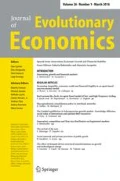Abstract.
Counterfactual conditional statements are ubiquitous in any scientific endeavour. This paper contains an analysis of the nature of counterfactual conditionals and the conditions under which they are considered assertable by scientists. The paper then applies this analysis to the use of counterfactuals in evolutionary economics, arguing that because evolutionary economics is inherently concerned with historical processes it cannot avoid the use of counterfactual history as one of its tools of empirical analysis. We discuss the strengths and pitfalls of counterfactual history. We argue that because evolutionary economics starts from the foundation that randomness may be inherent in any economic system, the very aspects of evolutionary economics that make counterfactual history a desirable empirical tool also make that tool difficult to employ.
Similar content being viewed by others
Author information
Authors and Affiliations
Additional information
RID="*"
ID="*" We thank the participants of the International Seminar on Evolutionary Economics as a Research Programme in Stockholm, May 1997, for many helpful comments. We also thank Lorri Baier for many helpful substantive and textual comments.
Correspondence to: R. Cowan
Rights and permissions
About this article
Cite this article
Cowan, R., Foray, D. Evolutionary economics and the counterfactual threat: on the nature and role of counterfactual history as an empirical tool in economics. J Evol Econ 12, 539–562 (2002). https://doi.org/10.1007/s00191-002-0134-8
Issue Date:
DOI: https://doi.org/10.1007/s00191-002-0134-8



